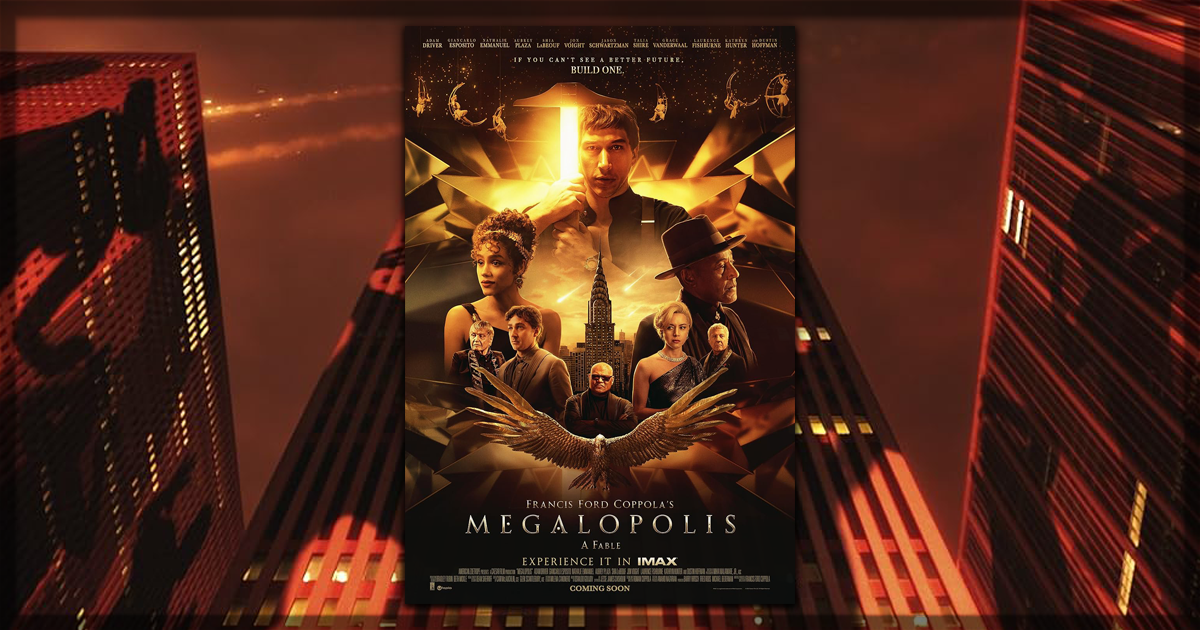Francis Ford Coppola’s first feature film in 13 years was always going to generate excitement, but Megalopolis – since its divisive Cannes premiere and disastrous marketing campaign with AI-generated quotes (the fault of US distributor Lionsgate, not Coppola) – is almost a sensation. Add in a star-studded cast, some of which have been ‘canceled’ (more on this later), and conflicting reports of unseemly behavior from the set, and it seems like nothing can unfold but a disaster of epic proportions.
And yet, Megalopolis is no disaster. By turns bad (notably the uncomfortable presence of known abusers among the cast), baffling, deeply silly, and achingly sincere, the story of a visionary, generational-talent architect locked in a bureaucratic war with a charismatic, autocratic mayor as New Rome – New York, slightly re-skinned and filtered in yellow – crumbles is big, bold, and profoundly moving.
Caesar Catilina (Adam Driver) has created a new super-substance, called “megalon,” by which he wants to build a “Megalopolis” to regenerate demolished zones in the centre of New Rome. Mayor Franklyn Cicero (Giancarlo Esposito) is initially skeptical – and has a personal vendetta against Caesar, who he believes escaped justice when found not guilty of his wife’s death when Cicero was Attorney General years before – but is slowly won over by Caesar’s vision. Also vying for influence on and behind the scenes are Hamilton Crassus III (John Voight) and Clodio Pulcher (Shia LaBeouf), Caesar’s uncle and cousin who respectively wield immense wealth and crave immense power, as well as self-made, social-climbing reporter Wow Platinum (Aubrey Plaza).
Appearances by Kathryn Hunter, Laurence Fishburne, Jason Schwartzman, Dustin Hoffman, and Talia Shire bring gravitas and commitment to the strange upper-class inhabitants of New Rome. The only cast weak link is Nathalie Emmanuel as Julia, Cicero’s daughter, whose accent wavers and never feels at home in the bizarre as compared to her castmates.
If this world of intrigue, politics, science, romance, and the dirty money funding it is not enough, Caesar can also “stop time,” freezing the world and allowing himself the impossible freedom to move about in ephemeral moments. This superpower is never explained, but as he walks along skyscrapers, watches a Soviet satellite fall to each, and remembers his inability to save his wife’s car plunging off a bridge, a picture emerges of regret, risk, and love for the world.
Catilina’s hubris and humanity both feed into megalon, and others’ perception thereof. Consequently, Megalopolis becomes a strange treatise on separating the art from the artist and the impossibility thereof. Coppola’s wife, Eleanor Nell, died weeks before the Cannes world premiere, and the film is dedicated to her memory. Watching Megalopolis as an analogy for this loss would be incomplete and simplistic, but it is impossible to put the knowledge to one side when watching this, following this connection to find an unbearable sadness at the film’s heart.
In Megalopolis, love and grief become deep, ungovernable forces that empower memories and actions while threatening to overwhelm at every turn. At several points, Caesar breaks into almost-mawkish tributes to the beauty of human achievement, lines delivered without a trace of irony that teeter between the embarrassing and the heartbreaking. The effect, and Driver’s often-mysterious but always grounded performance, is overwhelmingly poignant.
That is not to say Megalopolis is without comedy, and its nuanced moments are interspersed with the ridiculous, the trite, and the nonsensical. A joke about a pop star’s chequered past feels especially strained and clumsy; a bawdy reference turns a moment of family drama into a farce; and Clodio’s paths is so obviously signposted as a Trump-style populist through a collection of rallies, swastikas, and the Lincoln assassination. The line readings given by the cast are never ordinary, though this panache elevates rather than detracts from the overall film. With so many streaming films seemingly designed for the memes and TikTok vertical framing, Megalopolis achieves true memorability through its originality.
This is not to say the film is an uncomplicated success. Plots are picked up and dropped without graceful transitions, and though termed “A Fable” in Coppola’s subtitle, Megalopolis is not always an astute or accurate observation of society and human nature. The class systems at play and the discontent of the displaced working class, moved to make way for Caesar’s dream city, are only broadly sketched. The script and its characters are mired in the casual misogynistic myth of the male genius and the woman whose love can anchor and unlock said genius man’s achievements. But calling the film misogynistic seems overly simplistic and ungenerous; Coppola’s “Fable“ works within these old tropes and legends, though a more coherent film may question them rather than espousing them wholesale. While a shame it is not applied across the board, its men are far more interesting in their venal fallibility.
Megalopolis’ big swings and bigger heart make it infinitely preferable to any risk-averse, produced-by-committee corporate franchise product made to placate a focus group. A full assessment of the film’s shortcomings and weaknesses may not be apparent for another thirteen years, though hopefully it takes Coppola less time to fund and film his next feature film. A labor of love, loss, and a heartfelt belief in humanity that borders on naivete, Megalopolis may be a masterpiece.


